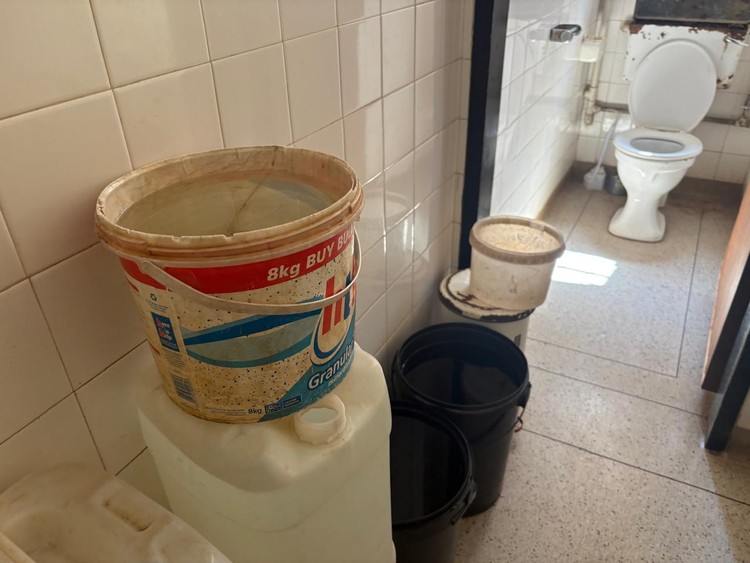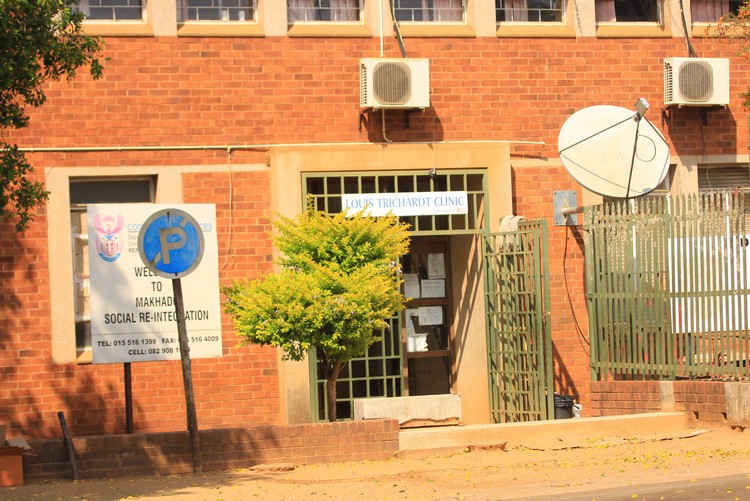Staff at this government building have to carry buckets of water to flush toilets
The Public Servants Association is calling on the labour department to intervene
Government workers employed by the departments of health, social development, agriculture, and labour have to carry around buckets of water to flush toilets in the building which has been without a consistent water supply for years. Photos: Thembi Siaga
- A government building housing several departments, including the Louis Trichardt Clinic, has been without consistent water supply for two years.
- Members of the Public Servants Association want the Department of Labour to intervene, claiming that working without proper access to water “violates occupational health and safety laws”.
- Initially the municipality said the water would be resolved this week once three boreholes were completed. But the situation remained unchanged on Friday morning.
The Louis Trichardt Clinic in Limpopo has been without consistent water supply for two years. But the water outage affects the entire government building which also houses Home Affairs, the Department of Social Development, Department of Agriculture, Forestry and Fisheries, Department of Labour and the Magistrates’ Court.
The clinic serves hundreds of patients daily. Patient Jonas Erasmus said the water issue started two years ago. “The clinic is clean, but there’s no water. It’s a big problem. We have to pay R3 to use a public toilet. I come here every month for my heart condition,” he said.
The Public Servants Association (PSA) has condemned the water shortage as a health hazard, saying it breaches occupational safety regulations. The Vhembe District Municipality initially supplied water tankers to the area, but this no longer happens. Now people in the building have to collect water in buckets from adjacent buildings.
Without running water, staff and patients are often seen carrying buckets to flush toilets.
A patient at the Louis Trichardt Clinic (in the same building) says those who can afford to, pay R3 to use a public toilet.
The PSA’s Lawrence Muvhango said the union became aware of the issue only after the town already had been experiencing a water crisis “[The municipality] promised to provide water tankers as a temporary solution,” he said. “But even after water was restored to the rest of town, this building remained without running water for years.”
Muvhango said the union has now asked the Department of Labour to intervene, as this “violates occupational health and safety laws”. “If nothing is done within 60 days, we’ll escalate the matter to the Office of the Premier and the Minister of Water and Sanitation,” he said.
Neil Shikwambana, spokesperson for the Limpopo Department of Health, confirmed that the building is owned by Public Works.
Municipal spokesperson Moses Shibambu said the issue, affecting the building and parts of the town’s centre, can only be resolved when three new boreholes — at the caravan park, tree park, and President Steyn Street — are operational again. According to the contractor, the boreholes were to be completed by Thursday, 25 September. But by Friday morning the water had still not been restored.
A notice at the entrance of the building read: “Kindly note that we are currently experiencing water shortages that are seriously affecting the services we provide to the public. Occasionally, we are forced to close the offices to comply with the Occupational Hygiene Act, reducing the hours we can remain open and the number of clients we can serve daily. Please bear with us as we navigate the best way out of this serious situation.”
When asked why the municipality had failed to keep its promise to restore water this week, Shibambu said: “Well, that’s what the contractor proclaimed.”
Support independent journalism
Donate using Payfast

Don't miss out on the latest news
We respect your privacy, and promise we won't spam you.
Next: Thousands march to Parliament calling for end to genocide in Gaza
Previous: Vryheid business owners join MK march for better service delivery
© 2025 GroundUp. This article is licensed under a Creative Commons Attribution-NoDerivatives 4.0 International License.
You may republish this article, so long as you credit the authors and GroundUp, and do not change the text. Please include a link back to the original article.
We put an invisible pixel in the article so that we can count traffic to republishers. All analytics tools are solely on our servers. We do not give our logs to any third party. Logs are deleted after two weeks. We do not use any IP address identifying information except to count regional traffic. We are solely interested in counting hits, not tracking users. If you republish, please do not delete the invisible pixel.


